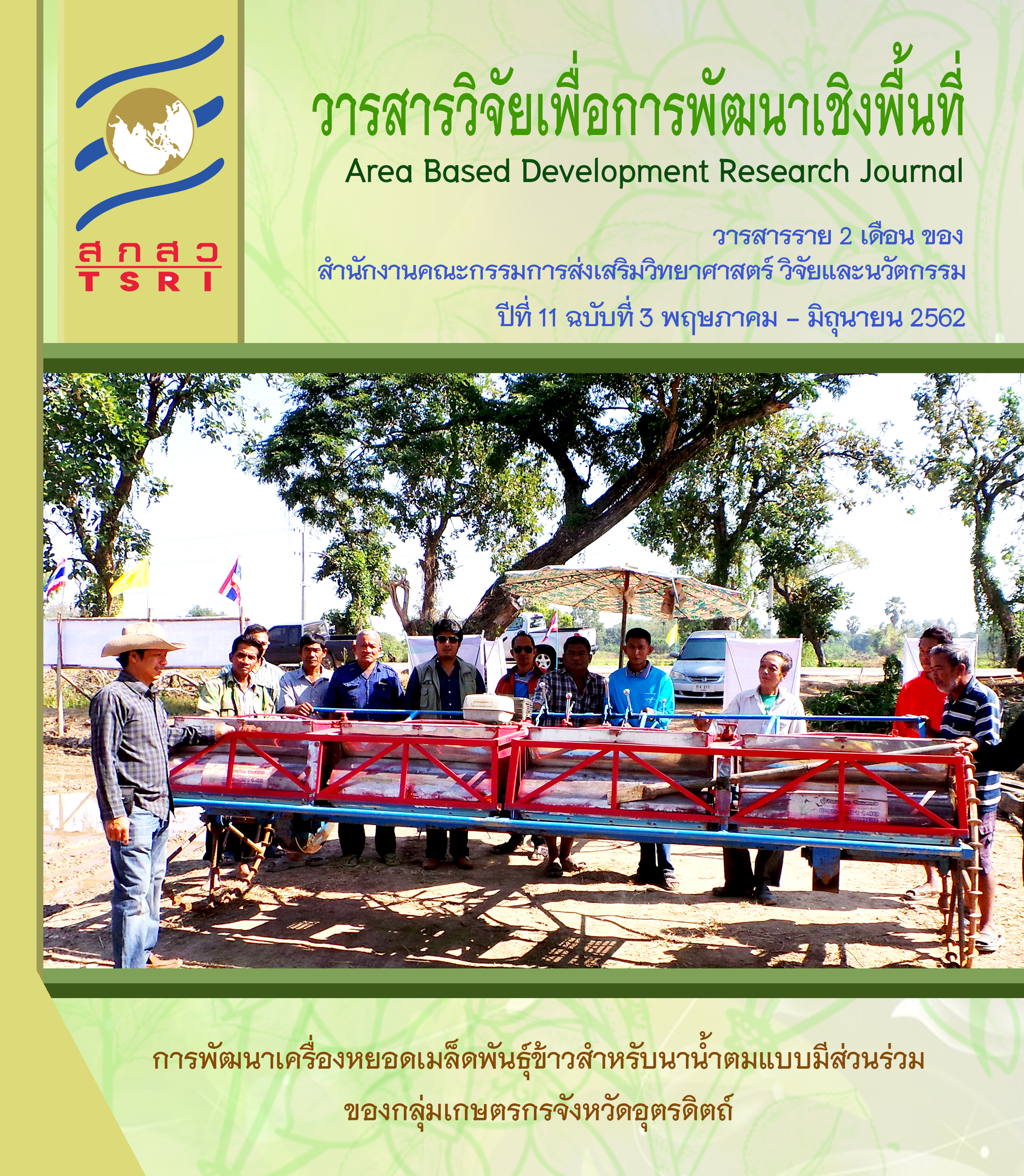Homestay Development Through Management Innovation for Sustainability: Ban Pang Makham Pom, Chiang Rai Province
Main Article Content
Abstract
This research project aims to study the community context, current situation, and readiness for homestay development of Ban Pang Makham Pom village through management innovation for sustainability. This research is conducted as a Participatory Action Research (PAR). The research instruments used for data collection include group discussion, questionnaires, observation form, and joint learning activities. The research target group consists of the president of sub-district administration organization, village head and deputy, homestay owners, Ban Pang Makham Pom school teachers, young adults, and related officers, with a total of 201 participants. Qualitative data is analyzed using content analysis techniques. The study shows that Pang Makham Pom village can be developed as natural conservative tourism spots. There are scenic viewpoints. Houses have sufficient provision of bed wares to accommodate guests. Strength, Weakness, Opportunity and Threat (SWOT Analysis) was conducted. The Strengths include tourist attraction spots with natural abundance, interesting way of life. The Weaknesses are lack of systematic management and lack of public relations. For the Opportunities, it is important to use new technology and the current trend on health care and well-being. The Threats refer to the inconvenience of transportation to the village. Therefore, the strategies were derived by TOWS framework to create competitive advantages and mitigate the weaknesses utilizing homestay management innovation which will lead to the change for sustainable management. These strategies include 1) Adding value and worth to community products 2) Developing people to support internal group management, and 3) Establishing effective communication. The six development guidelines are suggested: 1) Management with transparency and fairness. 2) Distribution of tourism service workloads to avoid redundancy. 3) Creation of unique tourism activities. 4) Promote the activities for young adults to utilize their free time, to learn and participate in the conservation of local tradition. 5) Create awareness for the stakeholders on the benefit and value of forest and 6) Active communication by directly providing information and news to tourists. These activities will satisfy people within the community as well as the participation with the homestay activities.
Article Details

This work is licensed under a Creative Commons Attribution-NonCommercial-NoDerivatives 4.0 International License.
Area Based Development Research Journal values copyright protection and licensing to safeguard author rights and facilitate the appropriate dissemination of research. Our policies ensure openness, accessibility, and attribution. Authors retain copyright ownership, and articles are published under a Creative Commons Attribution License (CC BY), allowing sharing, adaptation, and proper attribution. Authors have the freedom to publish under the CC BY license, granting broad reuse and distribution permissions. The journal supports posting articles on third-party repositories, adhering to institutional and funding restrictions. Author guidelines detail copyright and licensing requirements, empowering authors with knowledge about their rights and responsibilities. These policies cultivate an environment of collaboration, openness, and responsible sharing, benefiting authors and the research community while honoring intellectual property rights.
References
กรวรรณ สังขกร. (2555). ความรู้พื้นฐานและมาตรฐานการจัดการ Homestay. เอกสารประกอบการบรรยาย หลักสูตรอบรมการจัดการที่พักแบบโฮมสเตย์ (Homestay) รุ่นที่ 2 สาขาวิชาการท่องเที่ยว. เชียงใหม่: มหาวิทยาลัยเชียงใหม่.
คุณาวุฒิ บุญญานพคุณ . (2562). นวัตกรรมเพื่อชุมชน (Community innovation). สืบค้นเมื่อ 10 มกราคม 2562, จาก https://www.nia.or.th/innolinks/page.php?issue=201501§ion=4.
จินตนา กงเพชร, ประยูร วงศ์จันทรา และ จุไรรัตน์ คุรุโคตร. (2558). การพัฒนารูปแบบหมู่บ้านโฮมสเตย์เพื่อการบริการท่องเที่ยวเชิงอนุรักษ์ สิ่งแวดล้อมจังหวัดหนองบัวลําาภู. วารสารศึกษาศาสตร์มหาวิทยาลัยมหาสารคาม, 9(3), 166-184.
ธงชัย เลิศวิไลรัตนพงศ์. (2562). การจัดการความรู้ แนวคิดและทิศทาง. สืบค้นเมื่อ 12 กุมภาพันธ์ 2562, จาก https://www.dmsc.moph.go.th/MSTO/upload/knowledge/KM_DMSC.pdf.
ธีระพงษ์ โสดาศรี. (2562). การประชาสัมพันธ์เชิงรุก (Pro-active PR.). สืบค้นเมื่อ 15 มกราคม 2562, จาก https://www.stou.ac.th/offices/rdec/chan/main/Doc/Km/2556/Reference/STOU-CB7.2-4(1).pdf.
นรา หัตถสิน และ สายรุ้ง ดินโคกสูง. (2561). รูปแบบการท่องเที่ยวเชิงนิเวศ บ้านแหลมสวรรค์ จังหวัดอุบลราชธานี. วารสารวิจัยเพื่อการพัฒนาเชิงพื้นที่, 10(3), 243-260.
พิจาริณี โล่ชัยยะกูล. (2562). ความสําคัญของการบริหารจัดการการท่องเที่ยวอย่างยั่งยืน. สืบค้นเมื่อ 15 มกราคม 2562, จาก https://www.etatjournal.com/web/menu-read-web-etatjournal/menu-2012/menu-2012-apr-jun/449-22555-travel.
พิมพ์พร พิมพ์สุวรรณ, ชาสินี สําาราญอินทร์, ธาริดา สกุลรัตน์, ราชันย์ ปรึกษา และ เบญจพร เชื้อผึ้ง. (2561). การจัดการพักแรมในแหล่งท่องเที่ยวเชิงนิเวศ ชุมชนสามเรือน จังหวัดพระนครศรีอยุธยา. วารสารวิจัยเพื่อการพัฒนาเชิงพื้นที่, 10(1), 33-43.
วิจารณ์ พานิช. (2562). การจัดการความรู้. สืบค้นเมื่อ 20 มกราคม 2562, จาก www.rsu.ac.th/science/file/article/04_KM230853.pdf.
วีระศักดิ์ เครือเทพ. (2562). นวัตกรรมขององค์กรปกครองส่วนท้องถิ่น: พลังขับเคลื่อนสู่ชุมชนท้องถิ่นเข้มแข็ง. สืบค้นเมื่อ 30 มกราคม 2562, จาก intra.polsci.pn.psu.ac.th/add_doccument/doccufile/04-01-2013_16-38-51.ppt.
สาคร สมยศ. (2562). ข้อมูลพื้นฐานขององค์การบริหารส่วนตําบลสันสลี. สืบค้นเมื่อ 1 กุมภาพันธ์ 2562, จาก : www.sansalee.go.th/index.php.
อรอนงค์ เฉียบแหลม. (2561). ป่าจาก: ทรัพยากรทางธรรมชาติและแหล่งท่องเที่ยวของชุมชนขนาบนาก จังหวัดนครศรีธรรมราช. วารสารวิจัยเพื่อการพัฒนาเชิงพื้นที่, 10(6), 496-513.


